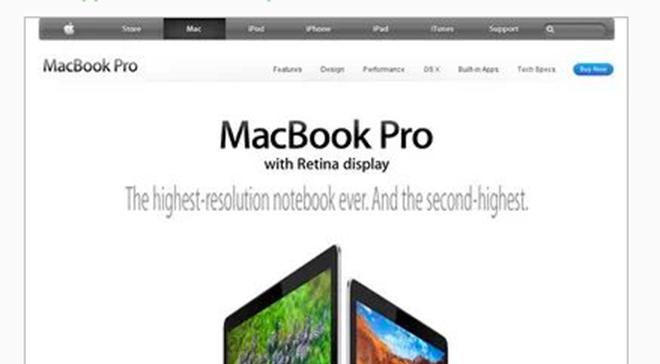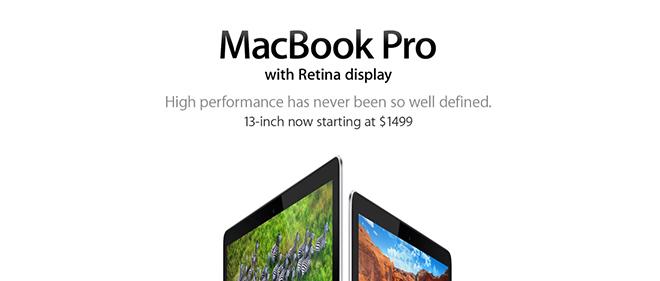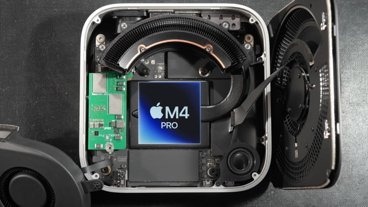Google's Chromebook Pixel outperforms Apple's Retina MacBooks in one particular spec, and Apple recently changed the way it markets its notebooks to reflect that reality.
[Update:] The product page still features the "highest-resolution notebook" language, but it's no longer the top item. The language is now the second item, and it appears to be reserved to the 15-inch model. The 15-inch model has more than five million pixels, while the 12.9-inch Chromebook Pixel has just over 4.58 million.
Apple, never shy in touting the specifications of its devices when they are at the top of industry offerings, used to market its 13- and 15-inch Retina MacBook Pros as "The highest-resolution notebook ever. And the second-highest." That's no longer the case, though, and the product page for the Retina MacBooks has changed to reflect that.
Bested — at least in terms of resolution — the Retina MacBook page now reads "high performance has never been so well defined."
Introducing the Chromebook Pixel in February, Google made sure to focus on the device's high-resolution screen. The Pixel's 2560x1700, 12.9-inch, touch-enabled LCD display has a pixel density of 239ppi. Apple's 15-inch and 13-inch Retina MacBooks have 220ppi and 227ppi densities, respectively.
Instead of a traditional computer OS, Google's ChromeBooks run a browser-based operating system developed by Google. While Google has continually upgraded Chrome OS since its release, bringing more features and capabilities, the OS still lags far behind Mac OS X, Windows, Linux, and even mobile operating systems such as Android and iOS in terms of capabilities. A variety of apps are available for Chrome OS, but Google faced some criticism for releasing a premium-priced product — the Pixel starts at $1,299 — that lacks the power, space, and application ecosystem of similarly-priced traditional notebooks.
 Kevin Bostic
Kevin Bostic









 Brian Patterson
Brian Patterson
 Charles Martin
Charles Martin


 Malcolm Owen
Malcolm Owen
 William Gallagher
William Gallagher
 Christine McKee
Christine McKee
 Marko Zivkovic
Marko Zivkovic








212 Comments
Apple, never shy in touting the specifications of its devices when they are at the top of industry offerings, used to market its 13- and 15-inch Retina MacBook Pros as "The highest-resolution notebook ever. And the second-highest." That's no longer the case, though, and the product page for the Retina MacBooks has changed to reflect that.
Captured after reading the news.
The ChromeBook is a great concept. All it needs is applications. Apple is moving to cloud storage for iTunes and eventually other things. Google will make cloud applications better over time. The benefit of cloud storage for applications is that they all can be updated without the users even having to bother with it. People will have the latest versions all of the time. Viruses shouldn't be a problem with cloud based software. ChromeBooks will probably move to the Nexus 7 model whereby the devices are cheaper because the prices of applications and other services will become the profit center. I wouldn't be surprised if Apple eventually incorporates that model into it's marketing system. If ChromeBooks do get to the point of being very popular Apple will have to compete in the hardware department price arena. The software might become Apple's profit center.
Captured after reading the news.
That's even on the same page. And this is on the next:
The ChromeBook is a great concept. All it needs is applications. Apple is moving to cloud storage for iTunes and eventually other things. Google will make cloud applications better over time. The benefit of cloud storage for applications is that they all can be updated without the users even having to bother with it. People will have the latest versions all of the time. Viruses shouldn't be a problem with cloud based software.
ChromeBooks will probably move to the Nexus 7 model whereby the devices are cheaper because the prices of applications and other services will become the profit center. I wouldn't be surprised if Apple eventually incorporates that model into it's marketing system. If ChromeBooks do get to the point of being very popular Apple will have to compete in the hardware department price arena. The software might become Apple's profit center.
It's a lousy product. There's no way you can create high-end applications for it since you can't actually write native code for it. All it does is run Web Apps inside a browser based OS. It's only good for basic tasks like e-mail, browsing, social interaction or creating basic documents. You can't do anything requiring graphical power (photo or video editing, illustration or even games). It would be useless for web developers since you don't have a way to check your website on multiple browsers for compatibility. You can't code or develop software on it since you're never going to see a Web App compiler (well, they could off-load the compiling to a third party but what programmer is going to trust their code to someone else to compile?).
And when you try and rape people $1,300 for a high-end version it's downright stupid. High-end hardware that lacks the software to do any high-end work.
Bottom line: great for simple tasks, useless for real work.
The benefit of cloud storage for applications is that they all can be updated without the users even having to bother with it. People will have the latest versions all of the time.
And what if we don't like the update? This sounds great in theory but in practice I feel it will not be as great.